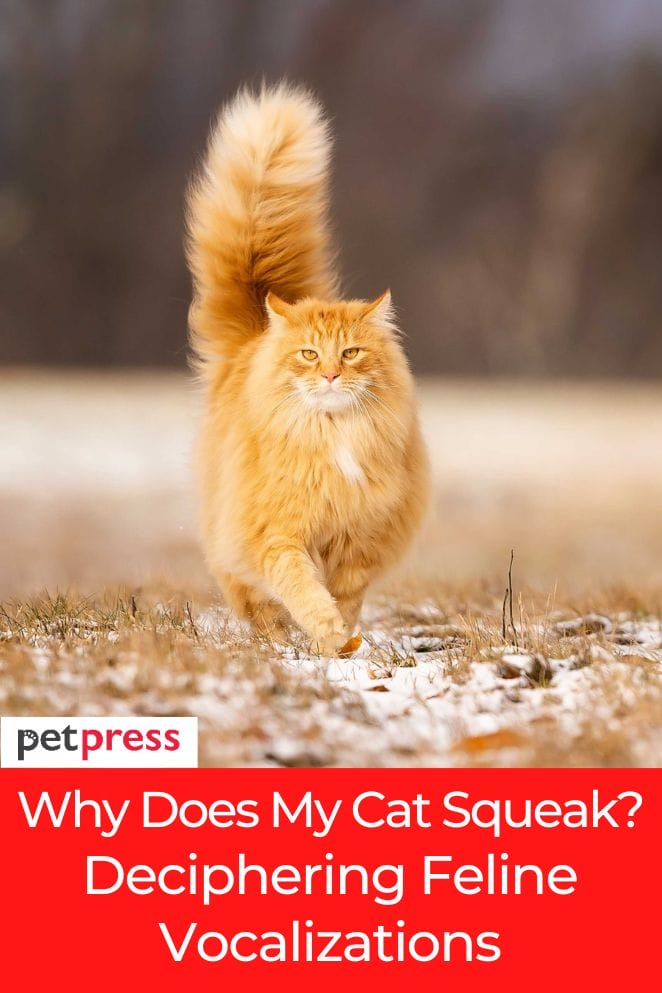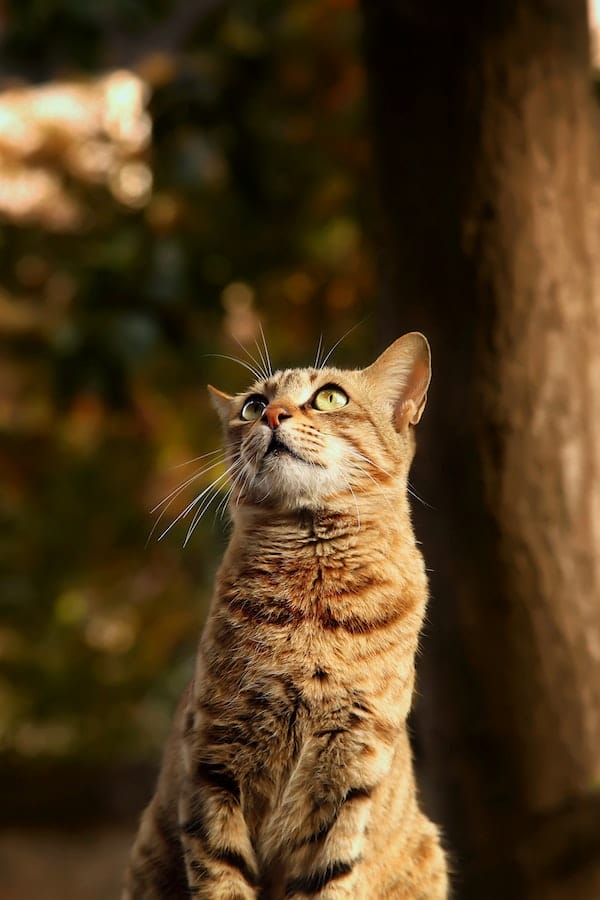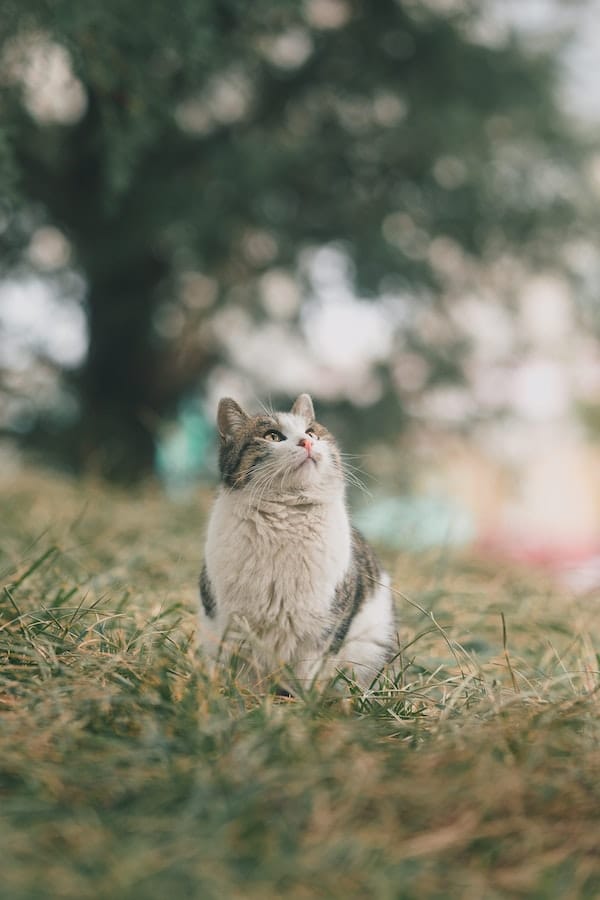
If you’re a dedicated cat owner, you’ve surely become accustomed to the symphony of sounds that emanate from your beloved feline friend.
From the comforting purrs to the frequent meows and, occasionally, those endearing squeaks, your cat is undeniably a virtuoso in the world of vocalization.
But have you ever found yourself pondering the timeless question:
“What’s the story behind those charming cat squeaks?”
In the forthcoming article, we’re embarking on an enthralling journey deep into the captivating realm of feline vocalizations.
Together, we’ll unveil the enigmatic reasons that underlie these irresistibly cute squeaky sounds.
Reasons Why Cats Squeak

Hunger pangs
Just like that familiar rumble in our own tummies, a squeaky cat might have one thing on their mind – food!
It’s like their way of politely reminding you, “Hey, it’s mealtime!”
We all know that look they give us, and that little squeak just seals the deal.
So, next time you hear that adorable squeak, it’s probably their way of saying, “Serve it up, please!”
To play
Cats are the champions of playtime, and sometimes they can’t contain their excitement.
Imagine a child’s giggle of delight while chasing a bouncing ball; for cats, squeaks are the equivalent.
They often let out these little squeaks when they’re in the middle of a playful adventure, especially when they’re chasing a feathered toy or playfully pouncing on an unsuspecting object.
Pain or discomfort
When it comes to cats, they often wear a mask of stoicism, but even they have their limits.
There’s a point where discomfort or pain can push them to express themselves with those telltale squeaks.
It’s as if they’re sending out an urgent message, saying, “Something’s amiss, and I need your attention.”
These vocal cues shouldn’t be brushed aside; they could serve as a vital indicator of an underlying health concern that deserves our immediate consideration.
Excitement
Just like we might let out a joyful shout when we’re bursting with excitement, cats have their version of a happy exclamation – the squeak!
When they’re thrilled or feeling particularly playful, these little squeaks are their way of saying, “I’m on cloud nine!” It’s like the exuberant cheers you hear at a lively party.
Attention-seeking
Let’s talk about one of the feline universe’s most charming traits—attention-seeking.
Cats are absolute maestros when it comes to seeking our undivided focus, and those adorable squeaks are often their chosen method.
It’s akin to a beam of light in a dimly lit room; they crave the spotlight, wanting everyone’s gaze to be on them.
Whether it’s a gentle nudge to remind you of their presence or a firm request for a chin scratch, those squeaks serve as their endearing little attention-grabbers.
To purr
Have you at any point been captivated by the pleasant purring of your cat?
Indeed, there’s something else to that calming purr besides meets the ear.
In fact, it’s not all purring; there’s a subtle undertone of squeak woven into it!
A cat’s purr can be likened to a harmonious composition of contentment, fusing the deep resonance of a low-pitched meow with the occasional high-pitched squeak.
It’s their unique way of conveying, “Life is wonderful, and I’m a blissful feline!”
Medical conditions
Now, let’s delve into a topic that might raise a few eyebrows—those unexpected cat squeaks.
You see, sometimes, these seemingly random vocalizations can be indicative of an underlying health issue.
Take hyperthyroidism, for example.
This condition can lead cats to emit squeaks due to the elevated heart rate and respiratory rate it brings along.
Think of it as a cautionary alarm, much like the warning bells that demand our attention.
When to Be Concerned

While the occasional squeak is usually harmless and can even melt your heart, it’s crucial to be a vigilant cat parent.
Persistent squeaks
If your cat’s squeaks become a regular part of their vocabulary, it’s time to take notice.
Much like if your friend suddenly starts speaking a new language, consistent squeaking is your cat’s way of saying, “Something’s not right.”
They might be trying to communicate distress or discomfort.
Accompanying behaviors
Pay close attention to any additional signs that accompany the squeaks.
Is your cat suddenly less active, showing signs of lethargy, or experiencing changes in appetite or weight?
These are like flashing warning signs on the road.
If squeaking is combined with these behaviors, it’s a strong indicator that something’s amiss.
Always bear in mind that your cat’s health and happiness are of utmost importance.
Their vocalizations can be a subtle plea for assistance.
Therefore, if those charming squeaks begin to overshadow their usual repertoire and become a regular feature, never hesitate to get in touch with your trusted veterinarian.
Conclusion
Amidst the rich tapestry of feline communication, those delightful squeaks are but one of the captivating melodies.
Each squeak from your beloved cat carries a unique message, expressing various emotions and desires.
Whether it’s a plea for food, a burst of excitement, or a gentle call for your companionship, these squeaks form an essential part of their expressive repertoire.
By attuning yourself to these cues and remaining vigilant for any uncommon or persistent squeaks, you’ll find yourself better equipped to comprehend and cater to the needs of your cherished feline companion.
FAQs
No, not all cats squeak. Cats have unique vocalizations, and while some may squeak occasionally, others may rarely do so.
Squeaking can sometimes indicate an underlying health issue, especially if it’s persistent and accompanied by other abnormal behavior. Consult your vet if you have concerns.
You can try to modify your cat’s behavior through positive reinforcement techniques, but remember that excessive vocalization could be due to an underlying issue that needs addressing.


GIPHY App Key not set. Please check settings